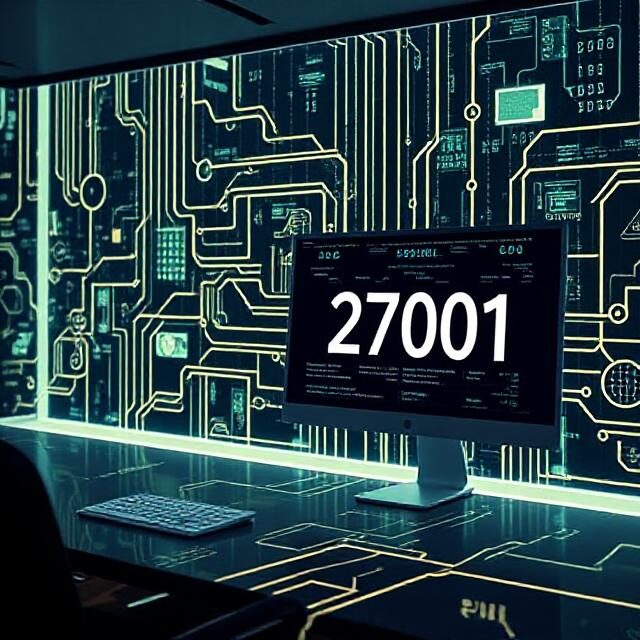
Let’s be honest—compliance isn’t exactly the word that excites most people. For many organizations, it brings to mind endless spreadsheets, legal jargon, and the constant worry of “Are we doing enough?” But here’s the truth that often gets overlooked: compliance isn’t just about avoiding penalties or satisfying auditors. It’s about trust. It’s about being the kind of organization that people—customers, partners, and even regulators—believe will protect their information no matter what.
That’s where ISO 27001 Certification steps in. It’s not just a badge for information security—it’s a structured, internationally recognized way to show that your organization takes security and compliance seriously. And when you’re dealing with sensitive data or contractual obligations, that commitment speaks volumes.
Why Compliance Feels So Overwhelming
You’ve probably noticed how compliance requirements never really stop changing. New privacy laws appear, existing ones evolve, and contractual demands from clients grow stricter by the day. One moment, you’re updating your data retention policies; the next, you’re being asked to demonstrate encryption standards or vendor risk management protocols.
For organizations juggling multiple frameworks—GDPR, HIPAA, PCI DSS, or even local data protection acts—it can feel like walking through a legal maze. The risk isn’t just financial; it’s reputational. One slip, one overlooked clause, and suddenly your credibility is under the microscope.
Here’s where ISO 27001 brings clarity. It doesn’t replace those laws or contracts—but it creates a single, cohesive structure that helps you meet them all consistently.
ISO 27001 in Simple Terms
At its core, ISO 27001 is the international standard for Information Security Management Systems (ISMS). Think of it as the blueprint for how an organization should handle, protect, and manage information responsibly.
Instead of tackling compliance obligations piecemeal, ISO 27001 encourages a systematic approach—one that identifies risks, implements controls, and continuously monitors effectiveness. It’s less about paperwork and more about building habits—routines that naturally keep your organization secure and compliant.
An ISO 27001-certified company doesn’t just have a strong security posture; it has proof that its processes have been independently evaluated against global standards. That matters, especially when you’re handling client data, government contracts, or confidential intellectual property.
Connecting ISO 27001 to Legal and Contractual Compliance
Here’s where things get interesting. Many businesses treat ISO 27001 and legal compliance as separate boxes to tick, but in reality, they’re deeply intertwined.
Let’s say your company manages personal data. You might need to comply with the EU’s General Data Protection Regulation (GDPR) or similar laws in other regions. ISO 27001 helps you do just that by enforcing principles like access control, encryption, and data retention management—core elements of GDPR compliance.
Similarly, if you work with clients who require strict confidentiality clauses, ISO 27001’s framework helps ensure that those obligations are not only met but demonstrably maintained. You’re not just saying “we protect data”—you’re showing how you do it, with documented procedures, regular risk assessments, and continuous improvement.
In short, ISO 27001 doesn’t just make compliance easier—it makes it credible.
The Real-World Ripple Effect of Certification
Let’s step back for a second. Imagine you’re a client looking for a new cloud services provider. You have two potential vendors: one that claims to “follow strong security measures” and another that proudly displays its ISO 27001 certification.
Who would you trust more?
Exactly. The second one. Because certification means the company’s security practices aren’t self-declared—they’ve been independently verified. That external validation builds confidence not only with clients but also with regulators, partners, and even internal stakeholders.
Many organizations find that once they earn ISO 27001 certification, compliance becomes less reactive and more proactive. Instead of scrambling whenever a new law or contract requirement appears, they already have the structure to address it. That’s a powerful position to be in.
Let’s Talk About Risk—Because That’s Where Compliance Really Begins
ISO 27001 is all about understanding risk. You can’t protect what you don’t know, and you certainly can’t comply with what you don’t understand.
During implementation, organizations perform a thorough risk assessment—evaluating how data is collected, processed, stored, and shared. This exercise often reveals surprising insights. Maybe your employees are sending sensitive files via unsecured channels, or perhaps a third-party vendor has more access than they should.
Identifying these weak points early allows you to apply targeted controls—like multi-factor authentication, network segmentation, or stricter supplier agreements. And because ISO 27001 certification requires documentation and review, you’re not just patching problems; you’re creating a traceable record of compliance efforts.
That kind of documentation can be a lifesaver when regulators or clients ask for evidence.
Legal, Regulatory, Contractual—What’s the Difference Anyway?
Let’s clear this up, because these three words often get mixed together.
Legal requirements are what the law demands. Think data protection acts, intellectual property laws, or labor regulations related to information handling.
Regulatory requirements come from specific industry bodies—like financial authorities or healthcare regulators—that set additional rules.
Contractual requirements are what your clients or partners expect you to follow, often detailed in service agreements or confidentiality clauses.
ISO 27001 weaves all these threads together. By establishing a structured ISMS, you can demonstrate that your organization not only complies with laws but also respects the trust of your partners and clients. It’s compliance made tangible.
The Power of Documentation—Proof That You Care
Here’s something auditors love to say: “If it isn’t documented, it didn’t happen.”
That might sound harsh, but it’s true. Compliance isn’t just about doing the right thing—it’s about being able to prove you did it. ISO 27001’s framework ensures that every security measure, risk assessment, and corrective action is documented and traceable.
This doesn’t mean drowning in paperwork. It means maintaining clear, accessible records that tell the story of how your organization manages information responsibly. So, when a client asks about your incident response procedure or a regulator requests evidence of access control, you have everything ready—organized, verifiable, and up-to-date.
Turning Policies into Practice
Many companies have policies that look great on paper but fail in execution. ISO 27001 certification demands that policies be more than just formalities—they must be lived out across the organization.
That means everyone, from leadership to interns, understands their role in protecting information. It’s not just the IT team’s job anymore; it’s a shared responsibility. And when compliance becomes part of daily culture—embedded in how people think and act—your organization becomes resilient almost by default.
It’s the difference between having a security policy and having a security culture.
Common Missteps (and How ISO 27001 Prevents Them)
Even well-intentioned companies can stumble when it comes to compliance. Some of the usual pitfalls include:
Inconsistent security controls across departments or branches.
Overlooking third-party risks, assuming vendors will handle their own compliance.
Poor incident response, where breaches aren’t reported or analyzed properly.
Lack of employee awareness, leaving room for human error.
ISO 27001 addresses all of this by requiring organizations to adopt a holistic view. Every control, process, and policy is interconnected—forming a system that identifies, manages, and monitors security risks continuously. It’s like upgrading from manual driving to an intelligent system that alerts you before things go wrong.
The Role of Leadership—Why Tone at the Top Matters
Here’s something worth emphasizing: ISO 27001 doesn’t work without leadership commitment. Executives play a crucial role in setting priorities, allocating resources, and embedding security into strategic decisions.
When top management views compliance as a value rather than a burden, it changes everything. Employees start to see information security not as an obstacle but as part of doing good business. And that’s when ISO 27001 stops being a checkbox exercise and becomes part of your organization’s DNA.
Beyond the Audit: Living the Standard Every Day
Achieving certification isn’t the end of the journey—it’s the beginning of consistency. ISO 27001 requires regular internal audits, management reviews, and continual improvement. That constant cycle ensures your ISMS doesn’t gather dust but evolves with changing risks and laws.
For example, when a new regulation like the Digital Personal Data Protection Act (DPDPA) or NIS2 Directive emerges, organizations with an ISO 27001 framework can quickly assess the impact, adjust controls, and stay compliant without chaos.
It’s like having a living organism—your ISMS grows, adapts, and strengthens over time.
How ISO 27001 Helps During Legal or Contractual Disputes
Here’s something many organizations don’t consider until it’s too late: in the event of a data breach or contractual dispute, ISO 27001 can serve as evidence of due diligence.
If you can demonstrate that your systems, controls, and training programs align with a globally recognized standard, it shows that you took reasonable steps to protect information. That can significantly mitigate penalties or reputational damage.
In some industries, ISO 27001 certification even reduces insurance premiums or fulfills client prequalification criteria. It’s compliance that pays for itself—literally.
Turning Compliance into a Competitive Advantage
Let’s face it—clients today are more privacy-conscious than ever. They want assurance that their information is in safe hands. ISO 27001 certification gives your business that edge.
It tells your partners, “We’re not just compliant; we’re committed.” It signals professionalism, transparency, and maturity—traits that open doors to larger contracts and international collaborations.
When competitors struggle to interpret complex regulations, your certified ISMS becomes a silent salesperson, demonstrating reliability before the conversation even begins.
Wrapping It Up: Compliance with Meaning
So, where does this leave us? ISO 27001 Certification isn’t about bureaucracy or paperwork—it’s about building trust. It brings together legal, regulatory, and contractual obligations into a single, coherent framework that strengthens your organization from the inside out.
Compliance doesn’t have to feel like a chore. When done right, it becomes a statement of integrity—a promise that your organization values responsibility as much as innovation.
And when you stand before clients, regulators, or partners, you can say with quiet confidence: We don’t just meet requirements. We embody them.


